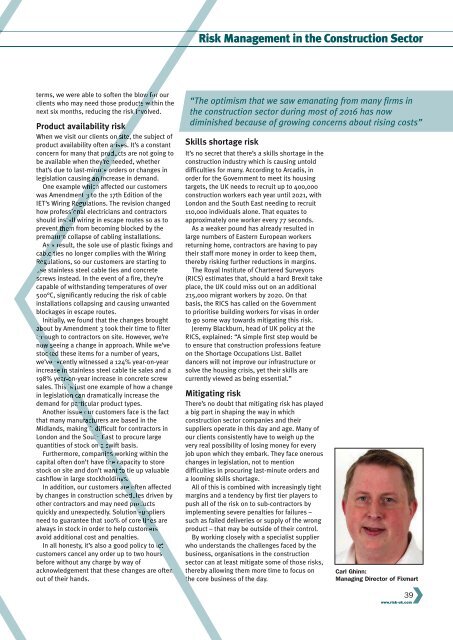RiskUKApril2017
You also want an ePaper? Increase the reach of your titles
YUMPU automatically turns print PDFs into web optimized ePapers that Google loves.
Risk Management in the Construction Sector<br />
terms, we were able to soften the blow for our<br />
clients who may need those products within the<br />
next six months, reducing the risk involved.<br />
Product availability risk<br />
When we visit our clients on site, the subject of<br />
product availability often arises. It’s a constant<br />
concern for many that products are not going to<br />
be available when they’re needed, whether<br />
that’s due to last-minute orders or changes in<br />
legislation causing an increase in demand.<br />
One example which affected our customers<br />
was Amendment 3 to the 17th Edition of the<br />
IET’s Wiring Regulations. The revision changed<br />
how professional electricians and contractors<br />
should install wiring in escape routes so as to<br />
prevent them from becoming blocked by the<br />
premature collapse of cabling installations.<br />
As a result, the sole use of plastic fixings and<br />
cable ties no longer complies with the Wiring<br />
Regulations, so our customers are starting to<br />
use stainless steel cable ties and concrete<br />
screws instead. In the event of a fire, they’re<br />
capable of withstanding temperatures of over<br />
500°C, significantly reducing the risk of cable<br />
installations collapsing and causing unwanted<br />
blockages in escape routes.<br />
Initially, we found that the changes brought<br />
about by Amendment 3 took their time to filter<br />
through to contractors on site. However, we’re<br />
now seeing a change in approach. While we’ve<br />
stocked these items for a number of years,<br />
we’ve recently witnessed a 124% year-on-year<br />
increase in stainless steel cable tie sales and a<br />
198% year-on-year increase in concrete screw<br />
sales. This is just one example of how a change<br />
in legislation can dramatically increase the<br />
demand for particular product types.<br />
Another issue our customers face is the fact<br />
that many manufacturers are based in the<br />
Midlands, making it difficult for contractors in<br />
London and the South East to procure large<br />
quantities of stock on a swift basis.<br />
Furthermore, companies working within the<br />
capital often don’t have the capacity to store<br />
stock on site and don’t want to tie up valuable<br />
cashflow in large stockholdings.<br />
In addition, our customers are often affected<br />
by changes in construction schedules driven by<br />
other contractors and may need products<br />
quickly and unexpectedly. Solution suppliers<br />
need to guarantee that 100% of core lines are<br />
always in stock in order to help customers<br />
avoid additional cost and penalties.<br />
In all honesty, it’s also a good policy to let<br />
customers cancel any order up to two hours<br />
before without any charge by way of<br />
acknowledgement that these changes are often<br />
out of their hands.<br />
“The optimism that we saw emanating from many firms in<br />
the construction sector during most of 2016 has now<br />
diminished because of growing concerns about rising costs”<br />
Skills shortage risk<br />
It’s no secret that there’s a skills shortage in the<br />
construction industry which is causing untold<br />
difficulties for many. According to Arcadis, in<br />
order for the Government to meet its housing<br />
targets, the UK needs to recruit up to 400,000<br />
construction workers each year until 2021, with<br />
London and the South East needing to recruit<br />
110,000 individuals alone. That equates to<br />
approximately one worker every 77 seconds.<br />
As a weaker pound has already resulted in<br />
large numbers of Eastern European workers<br />
returning home, contractors are having to pay<br />
their staff more money in order to keep them,<br />
thereby risking further reductions in margins.<br />
The Royal Institute of Chartered Surveyors<br />
(RICS) estimates that, should a hard Brexit take<br />
place, the UK could miss out on an additional<br />
215,000 migrant workers by 2020. On that<br />
basis, the RICS has called on the Government<br />
to prioritise building workers for visas in order<br />
to go some way towards mitigating this risk.<br />
Jeremy Blackburn, head of UK policy at the<br />
RICS, explained: “A simple first step would be<br />
to ensure that construction professions feature<br />
on the Shortage Occupations List. Ballet<br />
dancers will not improve our infrastructure or<br />
solve the housing crisis, yet their skills are<br />
currently viewed as being essential.”<br />
Mitigating risk<br />
There’s no doubt that mitigating risk has played<br />
a big part in shaping the way in which<br />
construction sector companies and their<br />
suppliers operate in this day and age. Many of<br />
our clients consistently have to weigh up the<br />
very real possibility of losing money for every<br />
job upon which they embark. They face onerous<br />
changes in legislation, not to mention<br />
difficulties in procuring last-minute orders and<br />
a looming skills shortage.<br />
All of this is combined with increasingly tight<br />
margins and a tendency by first tier players to<br />
push all of the risk on to sub-contractors by<br />
implementing severe penalties for failures –<br />
such as failed deliveries or supply of the wrong<br />
product – that may be outside of their control.<br />
By working closely with a specialist supplier<br />
who understands the challenges faced by the<br />
business, organisations in the construction<br />
sector can at least mitigate some of those risks,<br />
thereby allowing them more time to focus on<br />
the core business of the day.<br />
Carl Ghinn:<br />
Managing Director of Fixmart<br />
39<br />
www.risk-uk.com

















